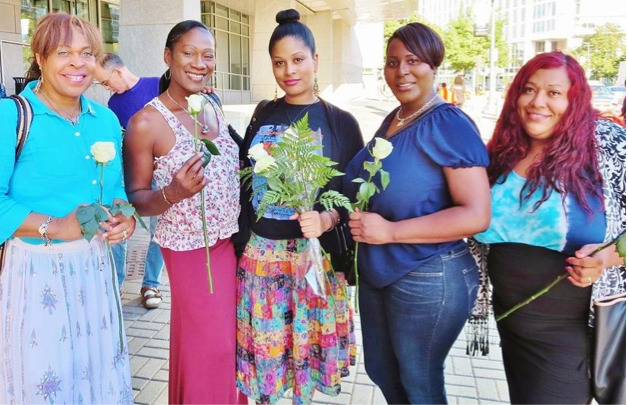 Photo courtesy Ashley Love, Black Trans* Women’s Lives Matter campaign
Photo courtesy Ashley Love, Black Trans* Women’s Lives Matter campaign
Trans* and intersex advocate Ashley Love reflects on vigil held for trans* women of color and the path toward peace
By Hannah Giorgis
In a bold, compassionate call to action to legislators and community members alike, over 50 people came together outside the Congressional Black Caucus (CBC) Conference in Washington, D.C. last month as part of the Black Trans* Women’s Lives Matter campaign. The vigil, organized to mourn the loss of so many transgender and transsexual women whose deaths have gone unpublicized by community members outside their close networks, was a call for both peace and inclusion.
Held outside the Walter E. Washington Convention Center, the vigil took place as 10,000 leaders, elected officials, and concerned citizens met for the CBCs annual legislative conference–a time when community-wide concerns are explored (and trans* women’s issues are notably not addressed).
“Seven Black and Latina women of transsexual history were murdered in this summer alone, yet the elected officials that are supposed to serve and protect us have generally remained silent,” said noted transsexual and intersex advocate Ashley Love, a journalist with Trans Forming Media and organizer with the Black Trans* Women’s Lives Matter campaign. “Whether it’s political inconvenience, immoral priorities, fear or religious bigotry, this epidemic is rarely given the attention it merits.”
Love has spent many years advocating for the needs of women like herself, women who must navigate a world that puts them at disproportionate risk of numerous forms of violence simply because they do not conform to established notions of gender. Love cited economic violence including employment and housing discrimination as two major barriers that her community faces.
“Our ‘call for peace’ event started with everyone introducing themselves and saying why they were present, with women holding white roses to symbolize peace,” Love said. “Invited speakers then gave remarks, and then the floor was open for everyone to testify. Next we moved to the vigil and Prayer for Peace portion, where all fifty of us joined hands in a large circle. We honored the memory of our fallen, and prayed for the safety of those of us still here.”
In organizing the vigil, Love said she was inspired by the resurgence of activism in the Black community following the events of Ferguson, and concerned that racial justice activism so often ignores trans* people, especially women.
“A lot of times we say ‘Black Lives Matter,’ but do we mean some or all? If you observe, it’s just some Black lives,” she said, nothing that Black victims must be perfectly respectable in order for their deaths to garner national outrage. Trans* women, whose bodies are dissected by even folks within the communities who ought to support them, are not seen as respectable or worthy enough to be fought for. The vigil addressed some of the roots of the transmisogyny that keeps trans* women excluded from broader racial justice campaigns (if not actively harmed by them).
“We then prayed for the elected officials inside the Center to let go of the fear-based attachments which are prohibiting them from choosing the just and moral action of standing up against the terrorism that is targeting ethnic girls and women of transsexual history,” Love said. Since the vigil, acts of violence have targeted multiple trans* women across the country, from Los Angeles to Brooklyn.
Love also noted that she has hope for the future, and particularly for the role non-trans women of color can play to amplify and alleviate the issues facing trans* women of color. Historically, non-trans Black women “have also been seen as masculine and misgendered–and are affected by transphobia, even despite not being trans,” she said.
“Moving forward, we’re focusing on genuine preventive measures to protect our community. The white LGB political establishment’s priorities are undemocratically and overwhelmingly on gay marriage, the military and other inventions of the state, with trans* issues on the back burner, so we now must look to the feminists and women’s movements and racial social justice community to aide our plight as they seem to be more aligned with our needs,” Love said.
“More education and resources need to be allocated to ensure our trans* youth can successfully transition in society. With all the awareness our vigil inspired, we are hopeful that compassion and solidarity will only get stronger.”
Hannah Giorgis
Ethiopian-American writer, organizer, artist, and awkward black girl trying to make sense of diaspora.
Catch up with me @ethiopiennesays.

